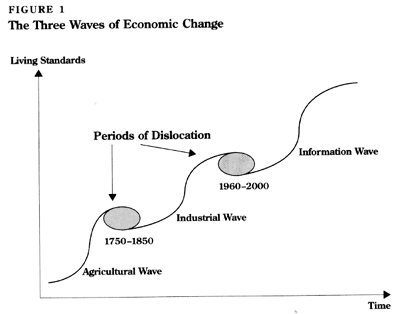"...we may have to start planning careers that move downward instead of upward through time...Perhaps [one] should reach his peak of responsibility very early in his career and then expect to be moved downward or outward into simpler, more relaxing, kinds of jobs."
Harold J Leavitt, quoted in Alvin Toffler's Futureshock, 1970

The greatest supervisory responsibility I had was for a class of 52 college freshmen in my care 3 days a week for an hour -- during which time I was to teach them the basic reading comprehension and writing skills they would need to thrive in the Texas state university system. It was my first professional job. I was 22 years old and paid $600/month.
Four years later came managerial responsibility for about 20 paid staff and as many volunteers (some of whom overlapped), a $100,000 budget, capital improvement goals, campus committee requirements and jump-and-run responsibility whenever the President needed more folding chairs. And I had never been happier.
As I stand in staff meetings today (no one runs for chairs anymore is what I'm saying) and watch the young managers pound their laptops and posture for the Boss's attention, I think of this quote often. I don't know how young they are, but I know for sure our executive's top tier is younger than I am, and that one of them is in fact 28. The people I suspect (and know for certain) have been working longer than I have all have lower ranking or consulting positions, with the exception of the Boss himself.
In a knowledge-based economy, experience is the commodity. It has to be built the hard way, while young, when one has everything to gain and very little to lose; when the idea of reading trade magazines on the treadmill and a fat business book on vacation sound like excellent career-edge-building opportunities; and you haven't yet discovered that the Company will not keep you warm at night. Once today's knowledge worker does realize that (or makes her millions), there is an gentle dial-down to a consultative role. Mentor the next generation who are quite sure they are presenting ideas that have never been tried.
In higher ed, there was no model for this. The faculty had their adjunct/visiting/emeritis system, where a person ran a cycle of TA, team/junior faculty, professorial ranking and chairmanships, then as one aged, scaled back down to part-time work, research, then finally just being trotted out occasionally at awards banquets like Johnny Pesky. In administration, one worked one's way to a deanship, provost, perhaps a Presidency -- none of which had tenure, but all of which you hoped you could retire from if the stress didn't kill you.
In 1970, when Alvin Toffler predicted this shift in management skill would flip, he used the training of engineers as an example, only marginally anticipating that technology and information would be the driving force of the US economy in "the future." Industry and agriculture were economies rooted in history, which one excelled in over decades of practice. In the future, he pointed out, the most recently educated and trained will be the most desirable, because knowledge will become obsolete. The young must lead because their skills are current, and the mature must advise them based on their experience, because their training is no longer applicable.
Toffler also wrote,
Thus we find the emergence of a new kind of organization man -- a man who,despite his many affiliations, remains basically uncommitted to any rganization. He is willing to employ his skills and creative energies to solve problems with equipment provided by the organization, and within teporary groups established by it. But he does so only so long as the problems interest him. He is committed to his own career, his own fulfillment.
[gender bias forgiven; ladies didn't have their own credit cards yet]
No comments:
Post a Comment
Comments Build Community! We thank you for yours. Spam comments are not welcome and will not be posted.